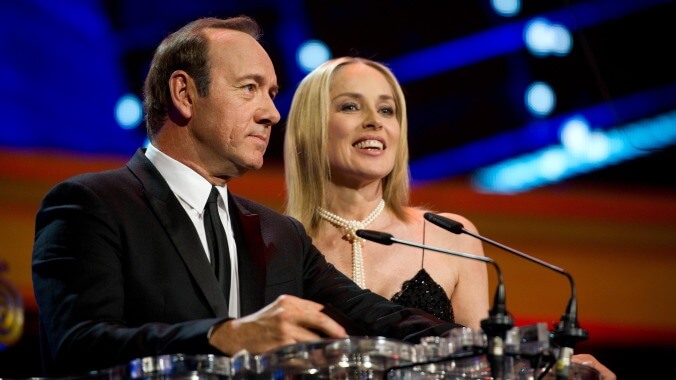Kevin Spacey and Sharon Stone Photo: Ian Gavan
Now that we’re a few years out from Kevin Spacey’s initial reckoning for sexual misconduct and he has a couple of legal victories under his belt, the actor has been trying to set the stage for his comeback. One part of that is calling up celebrity friends to vouch for his character, including Sharon Stone, whose initial statement on the subject was supportive, if incomprehensible. After praising Spacey as an actor, she said of his accusers, “It’s terrible that they are blaming him for not being able to come to terms with themselves for using him and negotiating with themselves because they didn’t get their secret agendas.” Is she shaming Spacey’s accusers for being closeted men? Or for being blackmailers? Her point is hardly legible. Luckily, The Hollywood Reporter gave her the opportunity to expand on her defense. And while it’s a little easier to understand, it’s, frankly, not any less baffling.
Stone has spoken before about her experience with abuse and misogyny in the industry. In conversation with THR, she suggests some of the post-MeToo shifts have been a “stifling” overcorrection. “Also, we really need to delineate between what’s a misdemeanor and what’s a felony. That needs to happen,” she says. “There’s a difference between a slap on the ass and rape. They aren’t the same thing.” That’s when the interviewer brings up her defense of Kevin Spacey, presented in full context:
You got into a little hot water recently for defending Kevin Spacey.
People are mad at me for that. I said that after being in therapy for seven years, not being allowed to work, losing his home, losing everything, he should be allowed to come back. He’s reached out to everybody he’s offended and said he’s sorry. Kevin grabbed people by their genitals. Many people. But nobody [has publicly said] he’s raped them or forced them into a sexual encounter. But there’s so much hatred for him because in his case it was man-on-man. That’s why he’s not allowed to come back. Because he offended men. But can I tell you how many men have grabbed my genitals in my lifetime? A lot more than Kevin Spacey has grabbed men’s genitals. And none of them has ever apologized to me.
So… there’s a lot to unpack here. While Spacey has been the victor in two trials (a civil lawsuit in the U.K. is still pending), he has at this point been accused of sexual assault by dozens of individuals—20 people within the Old Vic Theater alone. Spacey did publicly apologize to accuser Anthony Rapp with the caveat “if this happened.” Later, he essentially recanted his apology in court, denying that he’d ever had the encounter with Rapp and saying he had been pressured to make the statement by his team. Whether Spacey has apologized to the rest of his many, many accusers is unclear, but seems unlikely, given that it would leave him vulnerable to more legal liability.
And sure, “There’s a difference between a slap on the ass and rape,” but an unwanted assault is an assault. Groping someone’s genitals is a form of forcing someone “into a sexual encounter.” But the allegations against Spacey do go beyond groping—in testimony at the U.K. trial, one accuser suggested Spacey had drugged him at his apartment and claimed he woke up to Spacey performing oral sex on him. These allegations go well past the point of “offending” anyone. While homophobia may indeed affect people’s judgments, it doesn’t erase the real harm Spacey is alleged to have inflicted. It’s unclear whether Stone knows or understands the extent of the allegations against him, or if she’s being fed a very selective version of events from someone she herself describes as a “genius” actor. Either way, her defense is sadly illustrative of the fact that even someone who has experienced assault themselves may be motivated to protect a predator, if it’s someone they care about.
Stone’s belief that Spacey “should be allowed to come back” also leads to an essential problem surrounding “cancellation” in the entertainment industry: the idea that because someone has been a famous movie star, they should always be a famous movie star. There are, surely, other ways Spacey could make a living that aren’t high-level Hollywood productions. (Armie Hammer reportedly tried out selling timeshares in the Cayman Islands.) No one, “canceled” or not, is automatically owed roles in blockbusters. Celebrities’ fears around cancelation and losing their careers seem to speak as much to the ego of fame—that wealth, power, and recognition are things they inherently deserve—as it does to anything else. Regardless, Spacey’s got Italian film directors willing to cast him, film festivals willing to fête him, and famous friends willing to cape for him. It looks like he’ll be just fine.









































